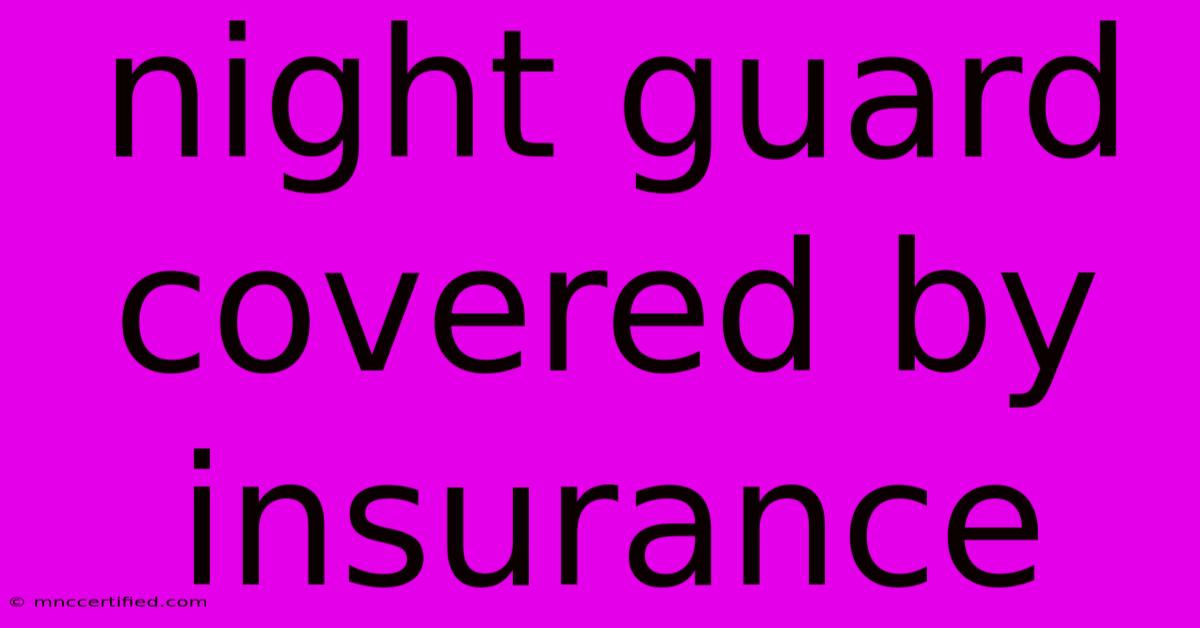Night Guard Covered By Insurance

Table of Contents
Night Guard Covered by Insurance: A Comprehensive Guide
Are you grinding your teeth at night (bruxism)? The constant clenching and grinding can lead to jaw pain, headaches, and even tooth damage. A night guard, also known as an oral appliance or mouthguard, can offer significant relief. But the question many ask is: Is a night guard covered by insurance? The answer, unfortunately, isn't a simple yes or no. Let's delve into the details to help you understand your options.
Understanding Dental Insurance Coverage for Night Guards
Dental insurance plans vary significantly in their coverage. While some plans explicitly cover night guards, many others don't, or only cover them under specific circumstances. The key factors influencing coverage include:
1. Diagnostic Necessity: The Foundation of Coverage
The most crucial factor determining whether your insurance will cover a night guard is whether your dentist can demonstrate a medical necessity. This means the night guard isn't just a preventative measure or a comfort item, but a medically necessary treatment to address a diagnosed condition like:
- Bruxism (teeth grinding): Your dentist needs to diagnose bruxism through a clinical examination and possibly additional tests. Evidence of tooth wear, jaw pain, or headaches can support the diagnosis.
- Temporomandibular Joint Disorder (TMJ): TMJ is a condition affecting the jaw joint, often accompanied by pain and limited jaw movement. A night guard can help alleviate symptoms.
- Sleep apnea (in some cases): While CPAP machines are the primary treatment for sleep apnea, some types of oral appliances can be used in conjunction or as an alternative, and might be covered under certain plans.
Without a proper diagnosis, your chances of insurance coverage significantly decrease. This is why a thorough examination and detailed documentation by your dentist are essential.
2. Type of Night Guard: Custom vs. Over-the-Counter
Insurance companies typically show a preference for custom-made night guards fabricated by a dental laboratory based on your dentist's impressions. These are more effective and comfortable than over-the-counter options. Over-the-counter night guards are rarely covered by insurance because they lack the personalized fit and precision of custom-made appliances.
3. Policy Specifics: Reviewing Your Plan Details
This is the most important step! Carefully examine your dental insurance policy's benefit booklet or contact your insurance provider directly. Look for specific language relating to:
- Orthodontic benefits: Sometimes, night guards are listed under orthodontic benefits, even if they aren't related to teeth straightening.
- Prosthodontics benefits: This section might cover appliances designed to replace or protect teeth.
- Specific limitations: Pay close attention to any annual maximums, deductibles, and co-pays that apply.
4. Pre-authorization: A Necessary Step for Many Plans
Many insurance plans require pre-authorization before any dental procedure, including the creation of a custom night guard. This involves your dentist submitting a treatment plan to your insurer for approval before proceeding. Failure to obtain pre-authorization can result in higher out-of-pocket costs.
Maximizing Your Chances of Coverage: Proactive Steps
- Choose an in-network dentist: Using a dentist within your insurance network can simplify the claims process and often lead to better coverage.
- Detailed documentation: Ensure your dentist thoroughly documents the diagnosis and the medical necessity of the night guard.
- Appeal denials: If your claim is denied, don't give up! Review the denial reason and appeal the decision with your insurer, providing additional supporting documentation if necessary.
- Explore alternative payment options: If insurance coverage is limited or nonexistent, consider options like payment plans, dental financing, or health savings accounts (HSAs).
Conclusion: Don't Assume, Investigate!
Whether or not your insurance covers a night guard depends on several factors, primarily the medical necessity of the treatment and the specifics of your insurance plan. By understanding these factors and taking proactive steps, you can significantly improve your chances of securing coverage and protecting your oral health. Remember, always check your policy details and communicate openly with your dentist and your insurance provider. Your investment in oral health is well worth the effort to understand your coverage options.

Thank you for visiting our website wich cover about Night Guard Covered By Insurance. We hope the information provided has been useful to you. Feel free to contact us if you have any questions or need further assistance. See you next time and dont miss to bookmark.
Featured Posts
-
Reykjanes Peninsula Eruption Starts
Nov 21, 2024
-
California Insurance Code 790 03
Nov 21, 2024
-
Jose Ibarra Life Sentence For Riley Death
Nov 21, 2024
-
Strictlys Janette Slams Aljaz Live
Nov 21, 2024
-
Backlash War And Treatys Harris Endorsement
Nov 21, 2024